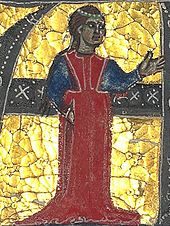Castelloza

Na[a] Castelloza (fl. early 13th century) was a noblewoman and trobairitz from Auvergne.
Life[]

According to her later vida, Castelloza was the wife of Turc de Mairona, probably the lord of Meyronne.[1] Turc's ancestors had participated in a Crusade around 1210 or 1220, which was the origin of his name (meaning "Turk").[1] She was reputed to have been in love with Arman de Brion, a member of the house of Bréon and of greater social rank than her, about whom she wrote several songs.[1] Her vida records her to have been "very gay", "very learned", and "very beautiful".[1] Only three—perhaps four if recent scholarship is accepted—of her songs (all cansos) survive, all without music.[2] This, however, makes her at least the second most prolific of trobairitz in terms of surviving works: only Beatriz de Dia certainly has more, with four cansos to her name.[3] The subject of all her poems is courtly love.
Compared with Beatriz de Dia, Castelloza is a more conservative poet. Her persona throughout her works is consistent and though she raises the tension between conditional and unconditional love she always remains committed to absolute fidelity.[4]
One scholar, Peter Dronke, has seen Castelloza's songs as forming a lyric cycle.[5]
List of works[]
- Ja de chantar non degra aver talan
- Amics, s'ie.us trobes avinen
- Mout avetz faich lonc estatge
- Per joi que d'amor m'avegna (disputed)
Notes[]
Footnotes[]
Citations[]
Works cited[]
- Bruckner, Matilda Tomaryn. "Fictions of the Female Voice: The Women Troubadours." Speculum, Vol. 67, No. 4. (Oct., 1992), pp. 865–891.
- Coldwell, Maria V. "Castelloza." Grove Music Online, ed. L. Macy.
- The Vidas of the Troubadours, ed. and trans. Margarita Egan. New York: Garland, 1984. ISBN 0 8240 9437 9.
Further reading[]
- Gravdal, Kathryn. "Mimicry, Metonymy, and 'Women's Song': the Medieval Women Trobairitz." Romanic Review, 83:4 (1992:Nov.) pp. 411–427.
- Paden, William D., Jr. "The Poems of the 'Trobairitz' Na Castelloza." Romance Philology, 35:1 (1981:Aug.), pp. 158–182.
- Schutz, A. H. "Where Were the Provençal 'Vidas' and 'Razos' Written?" Modern Philology, Vol. 35, No. 3. (Feb., 1938), pp. 225–232.
- Shapiro, Marianne. "The Provençal Trobairitz and the Limits of Courtly Love." Signs, Vol. 3, No. 3. (Spring, 1978), pp. 560–571.
- Weiss, Julian. "Lyric Sequences in the Cantigas d'amigo." Bulletin of Hispanic Studies, 65:1 (1988:Jan.), pp. 21–38.
- Bec, Pierre. « L’Amour au Féminin: Les Femmes-Troubadours et Leurs Chansons » (2013, fédérop).
- 13th-century French women writers
- 13th-century French troubadours
- 13th-century women composers
- Medieval French nobility
- Trobairitz
- French women poets
- People from Auvergne
